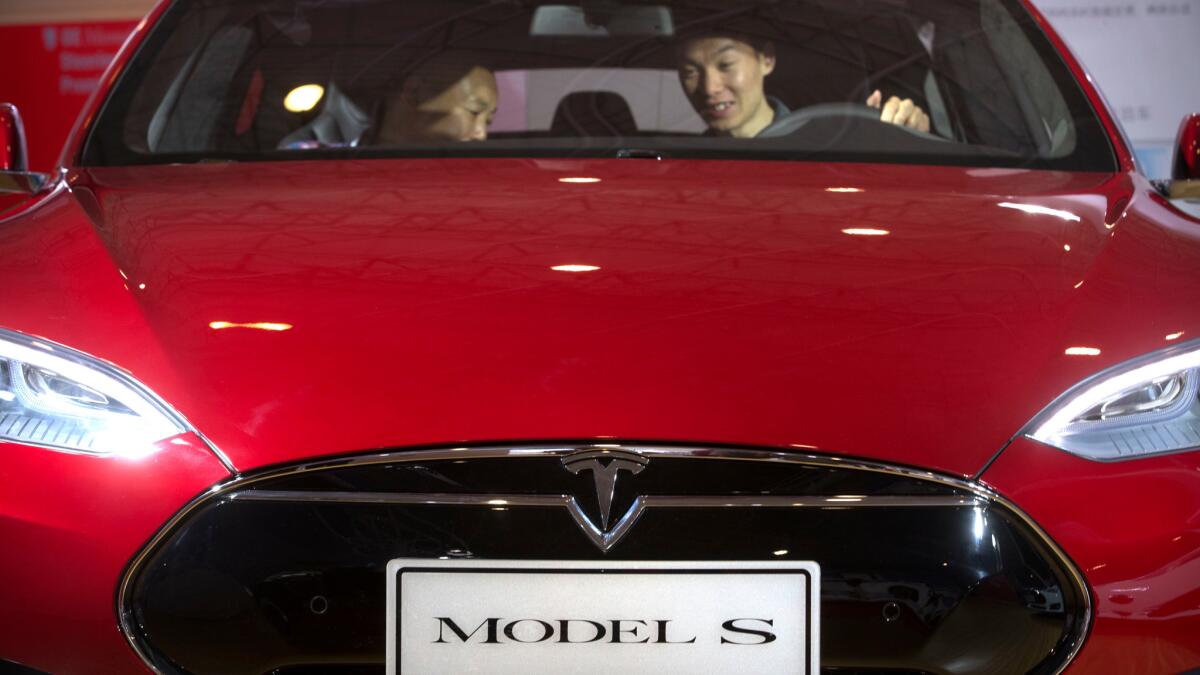Automotive tech firm Mobileye will end its partnership with Tesla

- Share via
Tech firm Mobileye, which makes chips and software for driver-assistance systems such as Tesla Motors Inc.’s autopilot feature, will end its partnership with the electric car maker.
In a call with analysts Tuesday, Mobileye co-founder Amnon Shashua said the Israeli company’s work with Tesla would not continue past the EyeQ3 technology, though it would continue to “support and maintain” the current Tesla autopilot plans. That support includes a “significant upgrade” of functions related to crash avoidance and auto steering.
“Moving forward to full autonomy Level 3, Level 4 autonomy, we think that that’s not in the interest of Mobileye to continue with Tesla in that area,” Shashua said in the call.
It’s not clear exactly when the partnership will end or why. Shashua said shipments of EyeQ3 would continue for the “near future” and “maybe even the longer future.”
The end of the partnership will not have “any material effect” Tesla’s plans, Chief Executive Elon Musk said in a statement. He said his Palo Alto, Calif., company is “laser-focused” on achieving full self-driving capability on one integrated platform and “with an order of magnitude greater safety than the average manually driven car.”
“This was expected,” Musk said. “Mobileye’s ability to evolve its technology is unfortunately negatively affected by having to support hundreds of models from legacy auto companies.”
Matt DeLorenzo, managing editor at Kelley Blue Book, said the end of the Tesla partnership could signal a shift toward more sophisticated driver-assistance systems and away from the camera-based systems peddled by Mobileye.
“A lot of the autonomous technology that’s being developed these days will rely on other types of sensors, radar … but more importantly, the big key component will be vehicle-to-vehicle communication,” he said. “Certainly, camera technology is pretty good, but it does have its limitations, especially when it comes to weather.”
See the most-read stories in Business this hour >>
Mobileye recently announced a partnership with Intel and BMW on the German automaker’s iNEXT vehicle model, which won’t require a human in the driver’s seat.
In Tuesday’s call, Shashua referred to that new relationship, saying advanced autonomy “requires partnerships that go beyond the typical OEM [original equipment manufacturer] supplier relationship” and that Mobileye “will continue to pursue similar such relationships.”
In May, a Model S using the autopilot feature was involved in a fatal crash in Williston, Fla., after a big rig made a left turn in front of the sedan. Tesla said the car passed under the trailer, and the bottom of the trailer hit the car’s windshield.
On Tuesday, the National Transportation Safety Board released photos from the accident, which showed the top of the Model S sheared off.
“Neither Autopilot nor the driver noticed the white side of the tractor-trailer against a brightly lit sky, so the brake was not applied,” Tesla said in a blog post shortly after news of the crash broke.
For more business news, follow me @smasunaga
MORE BUSINESS NEWS
China’s LeEco buys Irvine TV maker Vizio for $2 billion
Stocks finish mixed; McDonald’s plunges and Texas Instruments jumps
The truth about healthcare premiums: They’d be a lot higher without Obamacare
UPDATES:
2:20 p.m.: This article was updated with comments from Elon Musk.
This article was originally published at 12:35 p.m.
More to Read
Inside the business of entertainment
The Wide Shot brings you news, analysis and insights on everything from streaming wars to production — and what it all means for the future.
You may occasionally receive promotional content from the Los Angeles Times.







